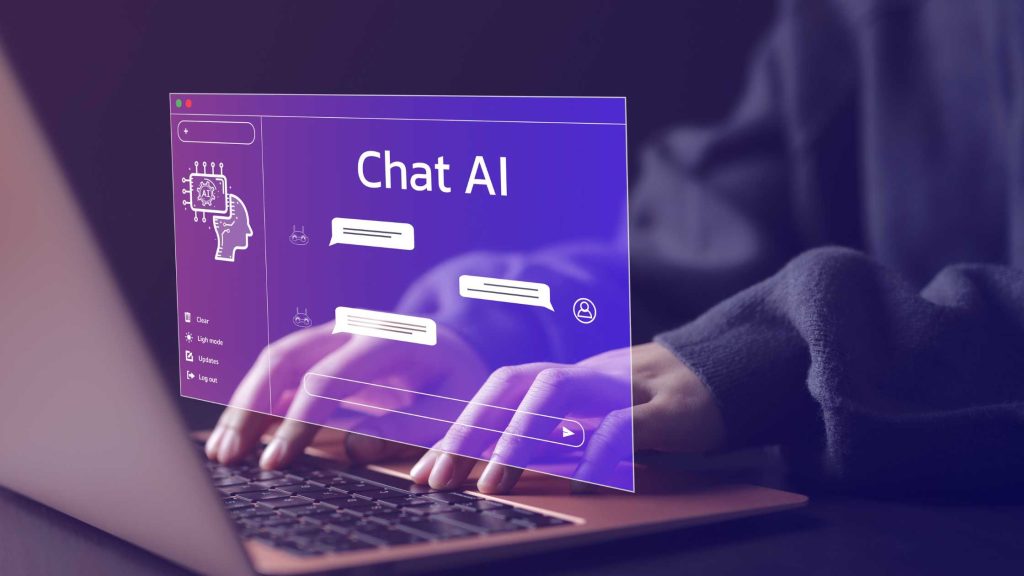How AI Is Used in Online Business ? : Comprehensive Guide 2024
How AI Is Used in Online Business : In today’s increasingly digital world, artificial intelligence (AI) has become a driving force behind the growth and success of online businesses. AI technologies enable businesses to optimize operations, engage customers, personalize user experiences, and make data-driven decisions.
Table of Contents
In this essay, we will delve into the various ways AI is transforming online businesses across diverse sectors, from e-commerce to digital marketing, customer service, and beyond. By understanding the practical applications of AI, business owners can harness its potential to stay competitive and enhance overall productivity.
1. AI-Powered Personalization
Personalization is a key element of success in online business. AI-driven algorithms analyze user data to create highly personalized experiences tailored to each individual. This has transformed how businesses communicate and engage with their customers, making interactions more relevant and impactful.
- E-commerce Platforms: AI personalizes product recommendations by analyzing customer browsing history, purchase behavior, and even demographic data. For example, Amazon’s recommendation engine is driven by AI algorithms that suggest products based on a user’s past purchases, search history, and items viewed by other customers with similar preferences. This leads to higher conversion rates and customer satisfaction.
- Content Personalization: AI helps content platforms like Netflix and YouTube provide tailored content recommendations. By analyzing user watch history, AI suggests shows, movies, or videos that align with the user’s interests, keeping engagement levels high and encouraging repeat visits.
2. AI-Driven Customer Support and Chatbots

Customer service is crucial for maintaining positive customer relationships, and AI-powered chatbots have become a game-changer in this field.
Also Read : What is Reselling on Amazon ?
These intelligent systems offer instant support, provide answers to frequently asked questions, and resolve common issues 24/7, often at a lower cost than human support teams.
- Natural Language Processing (NLP): AI chatbots utilize NLP to understand and respond to customer queries in a conversational manner. Businesses like Shopify and Zendesk integrate AI chatbots to enhance customer support by resolving routine inquiries quickly and accurately.
- Predictive Customer Support: AI can anticipate customer needs by analyzing historical data and behavior patterns. For example, if a user frequently encounters a specific issue, AI systems can proactively offer solutions or reach out to the customer with assistance before a problem escalates.
3. AI in Digital Marketing and Advertising
AI is revolutionizing digital marketing by making it more precise, targeted, and cost-effective. From automating tasks to predicting market trends, AI plays a crucial role in helping online businesses reach their target audiences.
- Targeted Advertising: AI-driven algorithms analyze user data to create highly targeted ads that match the interests, preferences, and buying habits of specific customer segments. Facebook, Google Ads, and other major ad platforms use AI to ensure that ads reach the most relevant audiences, maximizing return on investment (ROI).
- Predictive Analytics: By analyzing historical data, AI can forecast future customer behaviors, helping businesses make more informed marketing decisions. Predictive analytics tools, such as Salesforce’s Einstein Analytics, provide insights into customer trends, enabling businesses to optimize campaigns for maximum effectiveness.
- Content Generation and Optimization: AI-powered tools like Copy.ai and Jasper.ai assist marketers in generating engaging content quickly. These tools use machine learning algorithms to create blog posts, product descriptions, social media updates, and other content that aligns with brand messaging.
Buy Now : Top 300 AI Tools List
4. AI for Search Engine Optimization (SEO)
SEO is a critical aspect of online visibility, and AI is making it easier for businesses to optimize their content for search engines and attract organic traffic.
- Content Optimization: AI tools like SurferSEO and Clearscope analyze top-performing content for specific keywords and suggest optimizations to improve a page’s relevance and ranking. These tools provide recommendations on word count, keyword density, related terms, and content structure, enabling businesses to improve their search engine rankings.
- Voice Search Optimization: With the rise of voice-activated devices like Amazon Alexa and Google Assistant, AI helps online businesses adapt their content to better match voice queries. AI-driven tools analyze how people phrase queries when speaking compared to typing, guiding businesses to create content that aligns with natural speech patterns.
5. AI and Data Analytics
Data is the backbone of online businesses, and AI-powered data analytics solutions allow companies to extract actionable insights from vast amounts of data quickly and efficiently.
- Real-Time Analytics: AI algorithms process and analyze data in real time, offering businesses immediate insights into customer behavior, market trends, and website performance. Tools like Google Analytics leverage AI to provide detailed reports and predictive analytics, helping businesses make data-driven decisions.
- Customer Segmentation: AI clusters customers based on various parameters, such as demographics, purchase history, and online behavior. This segmentation allows businesses to target specific groups with tailored marketing campaigns, improving engagement and conversion rates.
6. AI-Powered Inventory and Supply Chain Management

Efficient inventory and supply chain management are essential for online businesses, particularly in e-commerce. AI optimizes inventory levels, predicts demand, and minimizes costs associated with overstocking or understocking.
- Demand Forecasting: AI uses historical sales data, market trends, and seasonality patterns to forecast demand accurately. Retailers like Walmart leverage AI-powered demand forecasting tools to anticipate stock needs, reduce waste, and optimize supply chain operations.
- Automated Order Fulfillment: AI streamlines order fulfillment processes by automating picking, packing, and shipping tasks. Warehouse automation solutions, such as those provided by robotics company Kiva (acquired by Amazon), improve efficiency and accuracy, ensuring that customers receive their orders quickly and accurately.
7. AI and Fraud Detection
Online businesses face significant challenges related to fraud and security breaches. AI plays a critical role in detecting and preventing fraudulent activities by analyzing patterns and identifying anomalies.
- Transaction Monitoring: AI systems monitor transactions in real time and detect potentially fraudulent activities based on unusual behavior patterns. Payment processors like PayPal and Stripe use AI to reduce fraud and protect customer data by identifying suspicious transactions and flagging them for review.
- User Authentication: AI-driven biometric authentication methods, such as facial recognition and fingerprint scanning, enhance security for online businesses. These methods provide a higher level of security than traditional passwords, reducing the risk of unauthorized access.
8. AI in Content Curation and Recommendation Systems
AI-driven recommendation systems curate content and suggest products or services to users based on their behavior and preferences. This not only improves user engagement but also boosts sales.
- News Websites: News platforms like Google News use AI to aggregate and curate articles tailored to a user’s interests, ensuring that readers see content most relevant to them.
- Streaming Services: AI-powered recommendation systems employed by Netflix and Spotify analyze user preferences to suggest shows, movies, and music that align with their tastes, keeping users engaged and returning to the platform.
9. AI for Automated Testing and Quality Assurance
In software development and online business platforms, AI can streamline testing and ensure the quality of applications by automating repetitive tasks.
- Automated Testing Tools: Tools like Selenium and Appium leverage AI to perform automated software testing, identifying bugs and issues that need to be addressed before deployment. This reduces testing time and helps developers release high-quality products faster.
- A/B Testing: AI optimizes A/B testing by analyzing user data and determining which variations perform better. For example, platforms like Optimizely use AI-driven testing to identify the best-performing website designs, layouts, and calls-to-action.
10. AI in Financial Management
AI tools help online businesses manage finances by automating routine tasks, analyzing financial data, and providing actionable insights.
- Automated Bookkeeping: AI-powered accounting software like QuickBooks and Xero automates bookkeeping tasks, such as categorizing expenses, reconciling accounts, and generating financial reports.
- Expense Management: AI-driven expense management tools can automatically track spending, detect patterns, and flag unusual expenses. This helps businesses maintain control over their budgets and reduce wasteful spending.
11. AI for Predictive Maintenance
For online businesses that rely on hardware infrastructure, AI-powered predictive maintenance tools can monitor equipment performance and predict when maintenance is needed.
- IoT and Sensors: Internet of Things (IoT) devices equipped with AI sensors can monitor critical hardware and predict potential failures before they occur. This reduces downtime and maintenance costs while ensuring that businesses can continue to operate smoothly.
12. AI-Driven Product Development and Innovation

AI is reshaping product development processes by accelerating innovation, reducing development times, and enhancing the overall quality of products.
- Generative Design: AI tools like Autodesk’s generative design software create optimized product designs based on specific constraints and goals. This approach can produce innovative solutions that may not have been conceived through traditional design processes.
- Product Testing and Simulation: AI-powered simulations allow businesses to test and refine products in virtual environments before physical production. This reduces costs and shortens the product development cycle.
13. Voice and Visual Search Capabilities
AI-powered voice and visual search tools are transforming how users search for products and services online, providing more intuitive and convenient ways to find what they need.
- Voice Search: Virtual assistants like Siri, Alexa, and Google Assistant rely on AI-driven voice recognition to process spoken queries. Online businesses can optimize their content for voice search to capture this growing market.
- Visual Search: AI enables users to search for products using images instead of text. For example, Pinterest’s visual search tool allows users to upload an image and find similar items online. This feature enhances user experiences and improves product discovery.
14. AI for Sentiment Analysis and Social Listening
Understanding customer sentiment is critical for online businesses, and AI-powered sentiment analysis tools help monitor and analyze customer feedback across various channels.
- Social Media Monitoring: AI tools like Brandwatch and Hootsuite Insights track social media conversations, identifying positive and negative mentions of a brand. This allows businesses to respond promptly and address customer concerns, enhancing their reputation.
- Customer Feedback Analysis: AI analyzes customer reviews, surveys, and feedback forms to determine overall sentiment and highlight areas for improvement.
15. AI and Predictive Lead Scoring
In online sales and marketing, AI-driven lead scoring tools prioritize leads based on their likelihood to convert, helping businesses focus on high-value opportunities.
- Behavioral Analysis: AI analyzes customer interactions, such as website visits and email opens, to assign scores that indicate purchase intent. This allows sales teams to concentrate their efforts on the most promising leads.
16. AI-Enabled Hyperautomation
Hyperautomation involves combining multiple AI technologies to automate end-to-end business processes, from marketing and sales to finance and supply chain management.
- Robotic Process Automation (RPA): AI-driven RPA bots automate repetitive tasks across multiple systems, improving operational efficiency. Online businesses can use RPA to automate order processing, customer onboarding, and other routine tasks.
How AI Is Used in Online Business – Conclusion :

AI has become an indispensable tool for online businesses, driving innovation and enabling companies to offer more personalized, efficient, and secure customer experiences. From enhancing marketing strategies and customer support to optimizing supply chains and financial management, AI transforms how businesses operate and engage with their customers. As AI technology continues to evolve, online businesses must stay informed and adapt to leverage its full potential, ensuring a competitive edge in the ever-changing digital landscape.
Buy Now : News & Magazine Website AI Automated
By embracing AI, businesses can create value for their customers, streamline operations, and achieve sustainable growth in an increasingly AI-driven world.
Keywords : How AI Is Used in Online Business – How AI Is Used in Online Business 2024 – How AI Is Used in Online Business 2025 , How AI Is Used in Online Business in Future , How AI Is Used in Online Business in India , How AI Is Used in Online Business in the world



